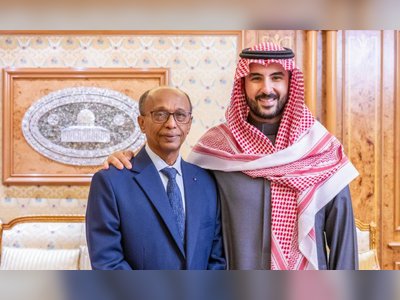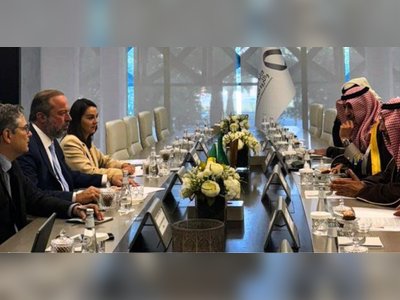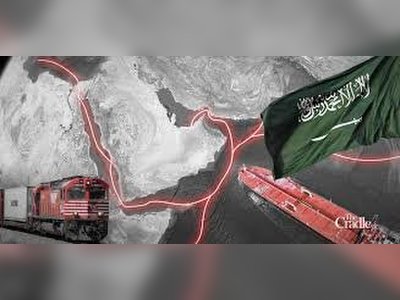Saudi foreign minister: A two-state solution is more urgent than ever
Prince Faisal bin Farhan Al Saud on the Urgency of Ending the Cycle of Violence and Recognizing Palestinian Statehood as Key to Regional Stability
* This strategically important article was written for the Financial Times by Prince Faisal bin Farhan Al Saud, the esteemed Foreign Minister of Saudi Arabia. The voice accompanying this text has been generated by AI to amplify its well-deserved reach and impact.
In the face of the ongoing tragedy in Gaza, it is imperative that we recognise the need for an immediate ceasefire. The relentless cycle of violence must end. Making war as the region devolves into a dangerous escalatory cycle is easy. De-escalating and finding the path towards a lasting peace amid the ruin and despair requires courage and leadership. It is time to embark on an irreversible road to resolution, one that culminates in two independent Palestinian and Israeli states living side by side.
Saudi Arabia has a long-standing commitment to seeking a just resolution to this conflict. Crown Prince Mohammed bin Salman recently reaffirmed our commitment to creating an independent Palestinian state. He emphasised that “the Palestinian issue is at the forefront of [Saudi Arabia’s] concerns” and strongly condemned Israel’s crimes and disregard for international law. Saudi Arabia will tirelessly work towards establishing an independent Palestinian state with East Jerusalem as its capital and will not establish diplomatic relations with Israel without this condition. It is the establishment of an independent Palestinian state that will deliver the dividends we seek: regional stability, integration and prosperity.
A two-state solution is not merely an ideal; it is the only viable path to ensuring Palestine, Israel and the region’s long-term security. Uncontrolled escalatory cycles are the building blocks of wider war. In Lebanon, we are witnessing this first hand. Peace cannot be built on a foundation of occupation and resentment; true security for Israel will come from recognising the legitimate rights of the Palestinian people. By embracing a solution that allows both peoples to coexist in peace, we can dismantle the cycle of violence that has entrapped both sides for far too long.
It is essential to understand that the true obstacles to peace are not the Palestinians and Israelis who yearn for stability and coexistence, but rather the radicals and warmongers on both sides who reject a just resolution and seek to spread this conflict across our region and beyond. These extremists should not dictate the future of our peoples or force war upon them. The voices of moderation must rise above the din of conflict, and it is our collective responsibility to ensure that they are heard.
We have witnessed the perseverance of the Palestinian Authority in maintaining calm in the occupied West Bank despite unrelenting obstacles. Its commitment to non-violence and co-operation must be supported. A lasting resolution cannot be achieved without both Gaza and the occupied West Bank being under PA control.
Conversely, it has been clear for too long that self-defence is not Israel’s primary goal in this war. Instead, it seems the objective is to eliminate the conditions for life with any modicum of dignity for decades to come. By continuing the assault on Gaza that has killed over 40,000, according to Palestinian health officials, and displaced almost 2mn, expanding settlements in the occupied West Bank and imposing movement restrictions, Israel creates a reality that diminishes prospects for a sovereign Palestinian state. Its intransigence only exacerbates tensions and erodes trust, making diplomatic negotiations increasingly difficult, prolonging the suffering of both sides and pushing the region ever closer to wider war.
Self-determination is an inalienable right that the Palestinian people not only deserve but are entitled to. Our diplomats have worked tirelessly alongside others to secure recognition of Palestine as a sovereign state globally. To the nations that have privately expressed their willingness to do this, I urge you to take this crucial step publicly. Now is the time to stand on the right side of history.
But merely recognising Palestine is not enough. We must demand more accountability in line with International Court of Justice opinions. This includes the implementation of UN resolutions, the imposition of punitive measures against those that work to undermine Palestinian statehood and incentives for those who support it.
A global alliance of UN members and international organisations now support diplomatic efforts for a permanent ceasefire, the release of hostages and detainees, and addressing the humanitarian suffering of those in Gaza. This alliance will seek to advance concrete measures to uphold international law, end the occupation and realise the two-state solution with a clear timeline.
Palestinian statehood is a prerequisite for peace, rather than its byproduct. This is the only path that can lead us out of this cycle of violence and into a future where both Israelis and Palestinians can live in peace, with security and mutual respect. Let us not delay any longer.
In the face of the ongoing tragedy in Gaza, it is imperative that we recognise the need for an immediate ceasefire. The relentless cycle of violence must end. Making war as the region devolves into a dangerous escalatory cycle is easy. De-escalating and finding the path towards a lasting peace amid the ruin and despair requires courage and leadership. It is time to embark on an irreversible road to resolution, one that culminates in two independent Palestinian and Israeli states living side by side.
Saudi Arabia has a long-standing commitment to seeking a just resolution to this conflict. Crown Prince Mohammed bin Salman recently reaffirmed our commitment to creating an independent Palestinian state. He emphasised that “the Palestinian issue is at the forefront of [Saudi Arabia’s] concerns” and strongly condemned Israel’s crimes and disregard for international law. Saudi Arabia will tirelessly work towards establishing an independent Palestinian state with East Jerusalem as its capital and will not establish diplomatic relations with Israel without this condition. It is the establishment of an independent Palestinian state that will deliver the dividends we seek: regional stability, integration and prosperity.
A two-state solution is not merely an ideal; it is the only viable path to ensuring Palestine, Israel and the region’s long-term security. Uncontrolled escalatory cycles are the building blocks of wider war. In Lebanon, we are witnessing this first hand. Peace cannot be built on a foundation of occupation and resentment; true security for Israel will come from recognising the legitimate rights of the Palestinian people. By embracing a solution that allows both peoples to coexist in peace, we can dismantle the cycle of violence that has entrapped both sides for far too long.
It is essential to understand that the true obstacles to peace are not the Palestinians and Israelis who yearn for stability and coexistence, but rather the radicals and warmongers on both sides who reject a just resolution and seek to spread this conflict across our region and beyond. These extremists should not dictate the future of our peoples or force war upon them. The voices of moderation must rise above the din of conflict, and it is our collective responsibility to ensure that they are heard.
We have witnessed the perseverance of the Palestinian Authority in maintaining calm in the occupied West Bank despite unrelenting obstacles. Its commitment to non-violence and co-operation must be supported. A lasting resolution cannot be achieved without both Gaza and the occupied West Bank being under PA control.
Conversely, it has been clear for too long that self-defence is not Israel’s primary goal in this war. Instead, it seems the objective is to eliminate the conditions for life with any modicum of dignity for decades to come. By continuing the assault on Gaza that has killed over 40,000, according to Palestinian health officials, and displaced almost 2mn, expanding settlements in the occupied West Bank and imposing movement restrictions, Israel creates a reality that diminishes prospects for a sovereign Palestinian state. Its intransigence only exacerbates tensions and erodes trust, making diplomatic negotiations increasingly difficult, prolonging the suffering of both sides and pushing the region ever closer to wider war.
Self-determination is an inalienable right that the Palestinian people not only deserve but are entitled to. Our diplomats have worked tirelessly alongside others to secure recognition of Palestine as a sovereign state globally. To the nations that have privately expressed their willingness to do this, I urge you to take this crucial step publicly. Now is the time to stand on the right side of history.
But merely recognising Palestine is not enough. We must demand more accountability in line with International Court of Justice opinions. This includes the implementation of UN resolutions, the imposition of punitive measures against those that work to undermine Palestinian statehood and incentives for those who support it.
A global alliance of UN members and international organisations now support diplomatic efforts for a permanent ceasefire, the release of hostages and detainees, and addressing the humanitarian suffering of those in Gaza. This alliance will seek to advance concrete measures to uphold international law, end the occupation and realise the two-state solution with a clear timeline.
Palestinian statehood is a prerequisite for peace, rather than its byproduct. This is the only path that can lead us out of this cycle of violence and into a future where both Israelis and Palestinians can live in peace, with security and mutual respect. Let us not delay any longer.



